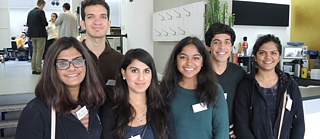1. PASCH Alumni Meeting
All the diversity of Berlin’s PASCH world

Debating in German? This event doesn’t have a problem with that. At the 1st PASCH Alumni meeting on November 10th and 11th in Berlin, around 120 participants share their experiences with heated heads and partially without accent. They all have degrees from a PASCH school on their hands and are now studying in Germany. Among them are six participants from India, Pakistan, Sri Lanka and Afghanistan.
“The articles,” “the vocabulary,” “the grammar” – if you ask the students their biggest difficulties with the German language, you’ll almost always get one of these three answers. But most of the participants in Berlin are taking these hurdles with flying colors. The language level is consistently high. But thankfully, their stories are diverse.
Love of order – cliché or reality?
For example, there’s Sreedar from Delhi. She lived in Switzerland already for a few years when she was a child. After returning to India, her parents decided to send her to a little school that offered German in the curriculum. A youth PASCH course in Lower Saxony ultimately prompted her to want to study in Germany. She’s currently visiting a fellow student in Constance and is primarily working on her technical vocabulary. What does she especially like in her host country? “It’s actually true that Germans are very well organized,” she says laughing. “It’s even true in the student dorms. Even if there’s a party, the most important thing is the appointed time.”Khan from Pakistan also changed his life’s plans after a trip. He participated in a cultural exchange when he was in 11th grade. That motivated him to learn more German – now he’s been studying medicine for two years at Charité in Berlin. “I always wanted to be a doctor,” he says. “An advantage of studying in Germany is that the tuition isn’t that high.” Kalana and Kasuni, twins from Sri Lanka, confirm this. Even their mother is a PASCH school alumni. Both of them are currently studying mathematics, but they want to change to a “more practical” discipline like engineering. In Berlin, they enjoy most of all the feeling of freedom.
It doesn’t work without work
But how do they finance living and studying in Germany? That’s one of the biggest questions for everyone here who doesn’t have wealthy parents. Like Qurban Ali Mohammad, a 25-year-old from Afghanistan, who already taught German in Kabul. Now he’s teaching a language course in Lübeck for refugees from his homeland. On the other hand, Malia from Pakistan works, alongside studying business informatics, in quality management for an online travel agency. She’s lucky. The job has to do with her studies. Her long-term goal is to have her own IT startup in Berlin.Great expectations for themselves and others – this unites the participants here, just as their enthusiasm does. Most of them want to enjoy the international atmosphere at this conference, making contacts and sharing experiences and perspectives. “There are young people here from all over the world, I think it’s amazing,” says Malia. The program is all about networking, with rounds of talks, workshops and future planning groups. Additionally, the “PASCH Alumni Projects of the Year 2016” will be chosen in the German Foreign Ministry. One of the six best project ideas came from India – from four pupils at the Sri Kumerans Children’s Home in Bangalore.